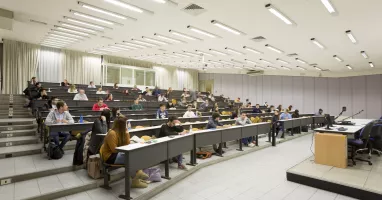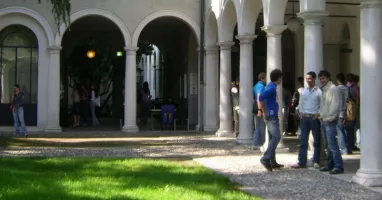The degree course in Economics and Management of Cultural and Creative Enterprises has the following specific educational objectives:
- to provide a sound basic methodology in the economic, mathematical-statistical and legal disciplines in order to be able to critically understand the economic logic of the context and operation of private and public cultural and creative enterprises;
- to characterise the training with a broad preparation in business disciplines in order to ensure a full understanding of the principles that characterise the management of enterprises applied to the various dimensional and sectorial typologies with a particular focus on cultural and creative enterprises;
- to acquire a broad knowledge of business disciplines broken down by functional areas (administration and control, finance, marketing, logistics, organisation, production);
- to develop a multi-disciplinary background that fosters the growth of the ability to analyse business dynamics, as well as to make decisions and manage in complex economic and social contexts such as those in which Cultural and Creative Companies (CCI) operate;
- to acquire the linguistic knowledge indispensable for communicating in the business world, with prevalent reference to the English language;
- to develop knowledge aimed at mastering IT tools commonly applied in business contexts.
The course of study in Economics and Management of Cultural and Creative Enterprises allows the acquisition of fundamental general and specific skills in the economic-business disciplines and an interdisciplinary training in the economic-political, legal and quantitative disciplines that make possible a multiplicity of employment prospects, both internal and external to companies and which can also be applied in profit and non-profit companies that enhance culture and creativity.
The professional profile to be trained is similar to that of a junior manager.
Requirements for admission to the study course and admission and verification procedures
Admission to the study course in Economics and Management of Cultural and Creative Enterprises is subject to the possession of the upper secondary school qualification required by the regulations in force or of another qualification obtained abroad recognised as suitable by the competent bodies of the University.
Possession of the prerequisites required for successful attendance of the course is assessed at the beginning of the first year by means of a compulsory entrance test, the TOLC-E organised by the University of Brescia in collaboration with the CISIA Consortium.
The TOLC-E aptitude test is of an indicative and non-selective nature and is designed to assess whether preparation in the basic disciplines is adequate and consistent with the requirements needed to successfully attend the chosen course of study. The TOLC-E may be taken at any university consortium with CISIA that provides for its provision.
An inadequate result, i.e. below the minimum threshold for passing, in the Mathematics section of the TOLC-E does not affect enrolment in the degree course or participation in classes.
Students who score below the pass mark in the Mathematics section of the TOLC-E are assigned an Additional Educational Obligation (OFA) in the area of Mathematics. OFAs in Mathematics are also assigned to students who do not perform the TOLC-E.
OFAs in Mathematics entail a General Mathematics Proficiency Examination and the first in itinere test of the same subject (if applicable), in accordance with the indications established by the CCSA.
In addition, for the remediation of OFAs in Mathematics, students enrolled in the first of the course may retake the TOLC-E, even after enrolment, at certain times during the academic year, in accordance with the indications established by the CCSA.
Students enrolled in the first year, until the completion of the OFA in the Mathematics area, may not sit the profit exams in the Mathematics, Statistics and Political Economics area, i.e. the profit exams of the courses taught in the scientific disciplinary sectors SECS-S/06 (with the exception of General Mathematics), MAT/09 (with the exception of the Computer Skills exam), SECS-S/01, SECS-P/01, SECS-P/02, SECS-P/03, SECS-P/05.
Students who do not complete the OFA in the Mathematics area by the end of the first year of the course of study in which they are enrolled will be admitted to the second year of that course (and to subsequent years), but, until the OFA is completed, they will not be able to sit examinations in the Mathematics area, statistics and political-economics, i.e. the profit exams of the courses taught in the disciplinary scientific sectors SECS-S/06 (with the exception of the exam for the General Mathematics course), MAT/09 (with the exception of the exam for the Computer Skills course), SECS-S/01, SECS-P/01, SECS-P/02, SECS-P/03, SECS-P/05.






